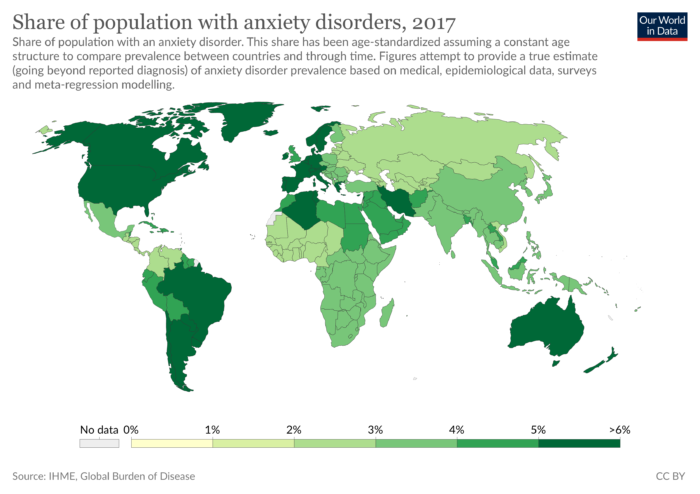5 Myths About Anxiety that Need to Go Away Right Now
Anxiety is surrounded by many myths. These ⓧ false ⓧ preconceptions can lead to negative consequences! Learn about anxiety myths and facts.
You’ve read dozens of blog posts on mental health. You’ve seen headlines of studies on anxiety. You’ve seen friends posting about their stress on Facebook. Anxiety seems to be everywhere. It can sometimes feel that, in a strange way, it has become a “trending” topic.
But, as it’s often the case with popular topics—the facts are mixed with a generous dose of fiction. Myths about anything can be dangerous because they create a false picture of reality. Specifically, myths about anxiety, can lead to people with anxiety to dismiss their symptoms or not seek treatment.
An honest conversation about mental health has to start from a common ground. In the spirit of building it we compiled a list of most prevalent myths we hear about anxiety. Of course, we pair them up with their corrected versions!
❌ Anxiety is rare
Anxiety is more common than… the common cold
Levels of anxiety are rising, you’ve probably heard that before. Over the 14 years between the 90s and 2007 the number of people with anxiety disorders increased by 12.4% in the UK1. That’s a lot!
But, what’s even more staggering is to realise how common anxiety is.
Most people express states of high stress at some point in their life. For instance, during the 2020-1 pandemic elevated feelings of anxiety affected 31.9% of people on average across 17 studies in different countries2.
The numbers are staggering even when we zoom in strictly on the clinically diagnosed anxiety disorder. Depending on the country, between 2.5% and 7% of people suffer from it, making this condition the most prevalent mental health disorder.
In 2017 it affected 284 million people3—that’s more than the population of France, Germany, UK, and Spain combined!

In the US, people seek out their GP for help with anxiety, depression, and bipolar disorder more often than for respiratory diseases, back pain, and headaches4.
It can be daunting to realise so many people suffer from anxiety. But, if you are one of them, it can also be comforting to realise you are not alone in what you experience. Opening up about anxiety can be difficult, but health professions are trained to help you with these experiences.
There are many widely available online tools that can help you find relief from anxiety when you need it.
❌ There is more anxiety now because the world is a more dangerous place
The world is becoming safer
Many people believe that the world has become a more dangerous place.
There are many ways to measure how “dangerous” the world is, and many of these measures show something different depending on where you are in the world.
But, for the most part, the world is becoming safer as time goes on, with lower crime rates and better health care in almost all places.
We have the perception that things are worse because we hear more about the bad things that happen, and this perception interacts with increasing anxiety.
❌ You should only seek help if it’s really bad
It’s important to get help for even milder experiences of anxiety
Many people think of anxiety as just “nervousness”—everyone gets stressed sometimes, right? What’s the big deal?
It’s true stress is a natural biological response that prompts us to act. But, sometimes the level of stress doesn’t match the threat around us, or the feeling continues for a long time. In these situations what evolved to help us starts to cause more harm than good.
The World Health Organisation defines health as “…a state of complete physical, mental and social well-being and not merely the absence of disease or infirmity.”
Mental and physical health also often interact with one another – mental health difficulties can lead to physical ailments, and vice versa.
Anxiety has implications on both physical and mental health.
A person with anxiety is more likely to suffer from major depression, suicide attempts, and it more prone to abuse alcohol or drugs. What’s more, anxiety has also been linked to many physical problems, such as asthma, coronary heart disease, irritable bowel syndrome (IBS), or ulcers5.
There is still a lot of stigma around mental health. This means many people feel reluctant to seek help, or don’t know where to find it.
The good news is that the situation is gradually changing.
Most doctors and health care professions around the world now recognise mental health as being just as crucial to our well-being as physical health and just as worthy of care.
This gradual change in approach, translates into action. For instance, in the UK in 2007 only around one in four people (24%) were accessing treatment for mental health disorders, like anxiety or depression. But, in 2014 already more than one in three (37%) were being helped.
This is a good sign.
While it partially reflects a growth in the prevalence of mental health issues, it also points to an increased awareness about the importance of mental health. Thanks to this, more people are ready to seek help for lower levels of difficulties which, if ignored, could lead to more serious outcomes.
❌ Anxiety is due to social media
Anxiety is not necessarily because of social media
Year after year more people suffer from common mental disorders, including anxiety6. Linking it to the increased use of social media would be a convenient explanation, but it’s not so simple.
Things that can seem intuitive or “common sense” don’t always match reality when studied. At the moment there is only weak evidence that using social media can increase anxiety, or that using computers and phones too much can be linked to mental disorders in young women6.
This is not the same as saying that social media can not increase anxiety.
It can.
But, different people experience anxiety differently. What causes a rise of anxiety in one person, might not have the same effect for someone else. So, it’s not a given that social media makes everyone more stressed, across the board.
You can see social media as a potentially addictive substance.
A little bit is generally fine, but consuming a lot can become a problem—moderation is key here. It’s also important to learn how social media influences your mood specifically, and decide at what threshold you want to start exercising more self-control.
❌ Anxiety is a choice
Anxiety stems from a mix of biological and environmental conditions
Lots of aspects of ourselves and our lives play a part in mental health, and many of these things are out of our control. This can include our genetics, our upbringing, social environments, economic circumstances, and various other life circumstances.
People who are socially isolated, have relationship or work stress, unstable housing and financial difficulty, low birth weight, and poor physical health are at a greater risk of experiencing anxiety.
Anxiety is a very common condition which, if untreated, can lead to more serious outcomes. This is why Mind Ease is on a mission of making evidence-based anxiety relief tools accessible to the widest amount of people. 👉 Try Mind Ease for free for 7 days!
P.s. If you read or hear any of these myths online or offline, feel free to share this post with those who spread them!
References:
[1] https://www.mentalhealth.org.uk/publications/face-fear
[2] https://globalizationandhealth.biomedcentral.com/articles/10.1186/s12992-020-00589-w
[3] https://ourworldindata.org/mental-health#anxiety-disorders
[4] https://www.ncbi.nlm.nih.gov/pmc/articles/PMC3564521/
[5] http://citeseerx.ist.psu.edu/viewdoc/download?doi=10.1.1.360.8349&rep=rep1&type=pdf





